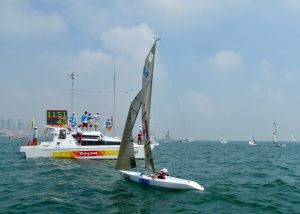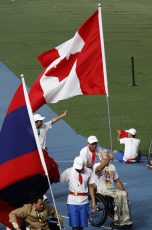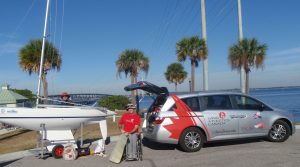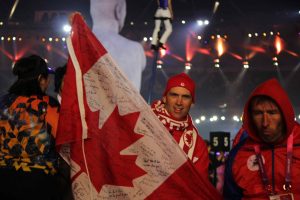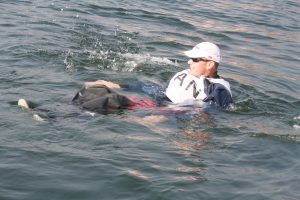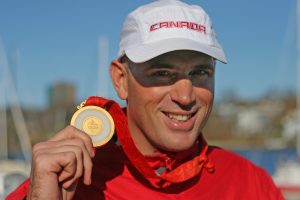
The story goes something like this… A young man, paralyzed waist down from a skiing accident, is paired with a physiotherapist who just happens to be a world champion sailor. The young man was Paul Tingley, the physiotherapist was Hall of Famer Judy Lugar, and the rest, as they say, is history.
“It didn’t take me long to figure out he was a pretty unique individual because he just didn’t waste any energy on stuff that wasn’t relevant,” says Lugar, who was inducted in 2006 with Morag McLean for their achievements as a two-person sailing team. “He was just ‘What do I have to do, tell me what I have to do and tell me how to do it and let’s get on with this,’ after a major change in his life.”
For Tingley, part of “getting on with it” was getting reacquainted with the sport of sailing.
Lugar recalls being out on Halifax Harbour with Tingley in cool and windy weather and asking if he’d done any sailing when he was younger. She remembers him responding, “Yeah I did a little bit, you know, I kind of have my bearings, but I can see myself doing more of this.”
Lugar describes that response as “prophetic.”
Tingley more than had his bearings, and would wind up doing a lot more sailing, with a level of dedication that was virtually unmatched. He approached sailing builder inductee Brian Todd to coach him to the next level.
“We’d meet every day at the squadron and we’d go out and we’d just train hard doing stuff in repetition so that he really got the basic fundamentals down pat,” says Todd. “He was just that keen to learn that he was willing to put it all out there.”
Along with that keenness to learn, Paul Tingley also had unique mental skills that made him a perfect match for the sport.
“I think Paul loves competition,” says friend and sports psychologist Colin Guthrie, “And he loves pressure. He seems to do pretty well under pressure where everybody else gets a little shaky or nervous. Paul gets nervous, but its seems to bring out the best in him, and so he always been able to deliver when the pressure is really high. It’s just part of his makeup. Some athletes got it, some don’t; he definitely does.”
“His frame of mind when he’s out sailing is always happy, never satisfied,” says Lugar. “So he’s a very positive person, but on the other hand, he’s always looking for a little bit more, trying a little harder, going a little further, not being afraid to take a gamble or two to see what comes of it.”
Never was that gambling gene more on display than at the 2008 Paralympic Games in Beijing.
Todd explains that Tingley was not a favourite to win going into the 2008 Games, but that he was happy to advance to the finals under the radar, where he then displayed extraordinary tactical skill to claim gold.
“Going into that last race, there were 25-30 competitors on the line,” explains Todd. “[Paul] goes off, he sails off in one direction along with another competitor or two, and the rest of the fleet goes a standard direction (butt to). Anyway, Paul goes off in this direction, gets a nice lead, holds the lead, and wins the regatta. He had a sense of where things might happen on that course and he was going for that opportunity.”
“When I won the gold medal that was a tremendous feeling,” says Tingley in a 2016 interview with CTV prior to the 2016 Paralympics. “It was not really expected of me, and I was over-the-moon excited.”
That gold medal win was the first-ever gold in Olympic or Paralympic sailing for Canada. Shortly after Beijing, Tingley continued to prove that he was a top sailor by both able-bodied and para-athlete standards, entering and winning the Open World Championship in the Netherlands, where anyone could compete, with or without disabilities.
“He’s the first sailor with a disability to win a world championship in the open class,” says Guthrie. “That was straight up, all the cards on the table, everything’s equal. He delivered in such a great way—still to this day, one of the most popular world champions I’ve ever seen in terms of being really well respected among the group.”
It’s a respect that has been well-earned, through a mindset and philosophy that have served Tingley so very well.
“If you put your mind to something, you can go maybe even further than you think you can, and setbacks in life sometimes just change your path but they don’t stop it,” says Lugar.
Guthrie believes Tingley exemplifies being fearless and overcoming obstacles: “If he sees something that he wants to try or he gets an invitation, he’ll never turn it down.”
Tingley explains that in sailing you can easily “go from first to last or last to first,” so it’s important to “go with the flow and wait it out and be positive.”
That patience has brought Tingley success in multiple classes of sailing, as an individual and as part of a team. That positivity has carried him through 18 years as part of the national sailing team and an impressive five Paralympic appearances. And that adaptable attitude has turned a life-changing accident into a place at the top of the podium.
Paul Tingley went on to coach the Nova Scotia sailing team of Jacob Chaplin-Saunders and Oliver Bone at the 2020 Olympic Games. He also spent five years leading the Parasport portfolio at Sport Nova Scotia and is credited with advancing a wide range of parasports provincially and nationally, including sailing, sledge hockey, sit ski, table tennis, and wheelchair basketball.
Cover photo courtesy of Sail Canada
- A member of the Canadian Sailing team for 18 years
- Competed in five Paralympic Games (2000, 2004, 2008, 2012, 2016)
- Paralympic gold medallist, 2008
- Paralympic bronze medallist in 2000 and 2016
- Sail Canada’s Sailor of the Year, 2008
- 2010 Open World Champion (competitors included able-bodied sailors)







